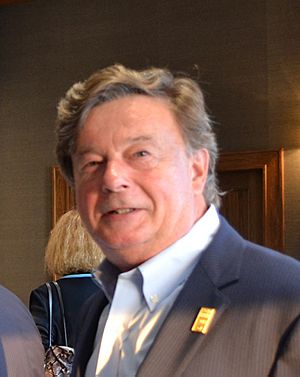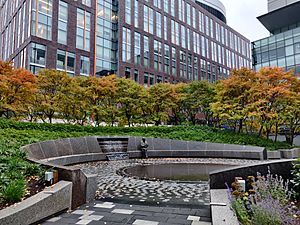Henri Termeer facts for kids
Quick facts for kids
Henri Termeer
|
|
|---|---|

Termeer in 2012
|
|
| Born | February 28, 1946 |
| Died | May 12, 2017 (aged 71) |
| Alma mater | Erasmus University |
| Occupation | Executive Biotechnology entrepreneur |
| Board member of | Verastem Genzyme (1983–2011) Federal Reserve Bank of Boston ABIOMED Inc Massachusetts Institute of Technology Corporation Massachusetts General Hospital Partners HealthCare System Fellows of Harvard Medical School Pharmaceutical Research and Manufacturers of AmericaBiotechnology Industry Organization Moderna Therapeutics (2013-) |
| Spouse(s) | Belinda Termeer |
| Children | Nicholas, Adriana |
| Parent(s) | Jacques and Mary (Van Gorp) |
Henri A. Termeer (born February 28, 1946 – died May 12, 2017) was a Dutch business leader and entrepreneur in the field of biotechnology. He is known as a pioneer for his work as the CEO of Genzyme.
Termeer created a special business plan that many other biotech companies later used. His company, Genzyme, developed treatments for rare genetic conditions called orphan diseases, which often affect children. These drugs were made using natural processes, making them hard for other companies to copy. Laws like the orphan drug acts also protected these medicines, helping Genzyme get good prices from insurance companies and governments.
As CEO of Genzyme from 1981 to 2011, Termeer helped the company grow a lot. He built strong connections with many important groups, including doctors, patient groups, insurance companies, and government officials. He was known as the "longest-serving CEO in the biotechnology industry." Termeer was also a big supporter of the biotech industry in Massachusetts, USA. He was even named one of the top 50 leaders in the field of orphan drugs and rare diseases.
Contents
Education and Early Career
Henri Termeer studied economics at Erasmus University in the Netherlands. In 1973, he earned his MBA from the Darden School at the University of Virginia in the United States. He also received an honorary Doctor of Science degree from the University of Massachusetts.
First Jobs
From 1969 to 1971, Termeer worked as a manager at Norvic Company, a shoe company in Norwich, United Kingdom.
Working at Baxter International
In 1973, Termeer started his career in the medical and healthcare product industry at Travenol Laboratories Inc., which is now called Baxter International. He worked in international product planning and marketing. Later, he became a general manager for Travenol in Munich, Germany.
From 1979 to 1981, he was an executive vice president for a division of Baxter that made products from blood plasma. This was an early step in biotechnology. Termeer also worked in Baxter's Artificial Organs Division, which made equipment for dialysis and heart/lung machines for surgeries.
Many leaders in the growing biopharmaceutical industry came from Baxter. By 2004, Henri Termeer's leadership at Genzyme was seen as a great example for other companies in the industry.
Leading Genzyme Corporation
In 1983, Termeer became the chairman, CEO, and president of Genzyme, a new biotechnology company that was only two years old. It was located in Cambridge, Massachusetts.
When Genzyme needed a place to make its products, Termeer chose to stay in Massachusetts and use local builders. This helped the biotechnology industry grow in the region. Harvard Business School professor Michael E. Porter described Termeer's strategy as building a "cluster" of related businesses and institutions. This helped Genzyme and other life science companies in Massachusetts become very successful.
Treating Rare Diseases
In 1991, Genzyme's first orphan drug called Ceredase was approved. It was the only treatment for Gaucher's disease, a rare condition.
At first, making Ceredase was difficult and expensive because it required many placentas. Genzyme later developed a new version called Cerezyme, which was easier and cheaper to produce using genetically engineered cells. Even though it cost less to make, Genzyme kept the price high. Termeer explained that the high profits helped the company fund research for other new drugs and give away some of the medicine for free to countries that couldn't afford it. By 2005, Genzyme even hired people to help patients get insurance to cover the cost of their drugs.
Helping with Pompe Disease
In 1998, the children of biotech executive John Crowley were diagnosed with Pompe's disease, a serious muscle disorder. Crowley worked hard to find a cure. In 2001, Genzyme bought Novazyme, a company researching Pompe's disease, and Termeer put Crowley in charge of Genzyme's Pompe program.
Genzyme's research paid off, and in 2003, Crowley's children received the new treatment developed by Genzyme. Crowley said the experimental treatment saved his children's lives. This story was even made into a Hollywood movie called Extraordinary Measures.
By 2006, Genzyme had grown from a small company with 14 employees to a major biotech company with over 8,000 employees worldwide.
Manufacturing Challenges
In 2009, Genzyme faced a problem when its manufacturing plant in Massachusetts became contaminated. This led to shortages of important drugs, including Cerezyme. The company was fined by the FDA for manufacturing issues. Because of these problems, Genzyme was later bought by another company, Sanofi, in 2011, and Termeer retired.
Shaping the Biotech Industry
Henri Termeer played a big role in shaping the biotechnology industry beyond Genzyme.
Biotechnology Industry Organization (BIO)
In 1993, Termeer helped create the Biotechnology Industry Organization (BIO) by combining two smaller groups. He wanted the biotechnology industry to have one strong voice. In 1997, he realized that BIO needed to work with patient groups and other organizations. Under his leadership, BIO successfully pushed for the Food and Drug Administration Modernization Act of 1997. This law made it easier and faster to develop and approve new drugs, which was very helpful for the industry.
New England Healthcare Institute
In 2002, Termeer helped start the New England Healthcare Institute (NEHI). This group brings together leaders from healthcare, biotech companies, hospitals, and patient groups to research and improve health policy. Termeer was a Chairman Emeritus of NEHI.
Mentoring New Leaders
After retiring from Genzyme, Termeer continued to mentor many former Genzyme colleagues who became CEOs of smaller companies. This group of biotech entrepreneurs is sometimes called the "Genzyme diaspora." He helped guide them in their new roles.
Awards and Recognition

Henri Termeer received many awards for his contributions to science and business:
- 1999: Golden Door award from the International Institute of New England, which honors immigrants who have positively influenced America.
- 2005: Genzyme received the National Medal of Technology and Innovation, the highest honor for technological innovation given by the President of the United States. Termeer accepted the award for Genzyme's work in improving the health of thousands of patients with rare diseases.
- 2012: Lifetime Achievement Award from Global Genes R.A.R.E Project. He was honored for leading Genzyme for almost 30 years and helping Massachusetts become a major center for biotech research. He was also recognized for developing treatments for rare diseases when other companies focused on more common conditions.
Other Activities
Termeer was connected to many different organizations and industries. He served on the boards of directors for companies like Moderna Therapeutics and ProQR Therapeutics, as well as institutions like the Federal Reserve Bank of Boston and the Fellows of Harvard Medical School.
Supporting New Biotech Companies
Termeer also provided financial support and advice to new biotech companies. For example, he backed Lysosomal Therapeutics, a company developing treatments for Parkinson's disease. He mentored its CEO, Dimitri Krainc, showing his continued dedication to helping new scientific breakthroughs.
Giving Back
Termeer was also a generous giver. He donated $10 million to the Massachusetts General Hospital Cancer Center. This donation helped fund research at the Henri and Belinda Termeer Center for Targeted Therapies, which conducts clinical trials for cancer patients. Termeer was also on the board of directors for the hospital.
Images for kids
-
Memorial in Henri A. Termeer Square in East Cambridge


